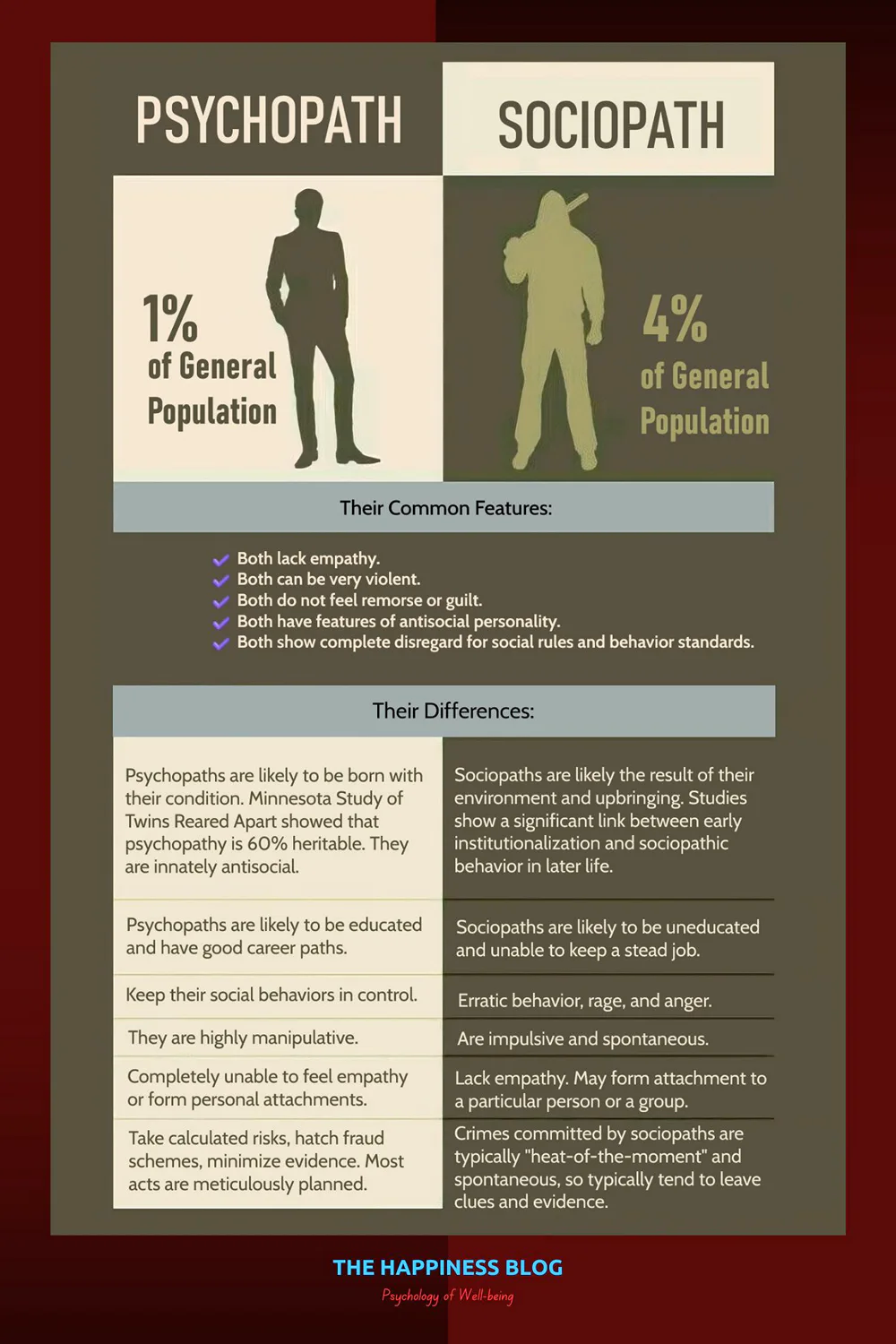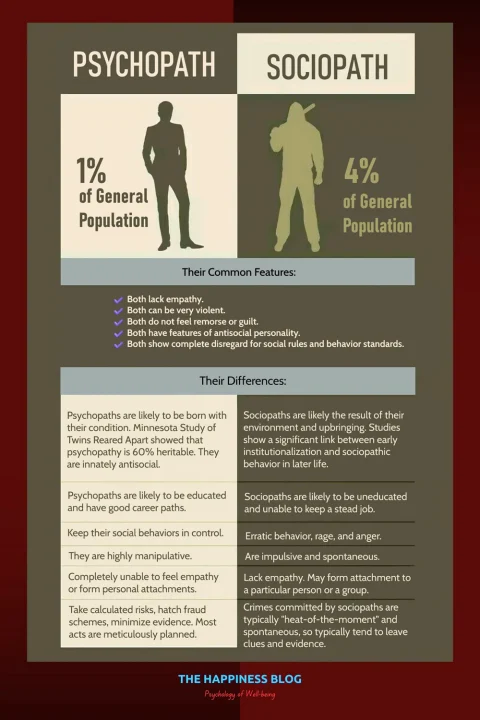Today's Wednesday • 11 mins read
Psychopaths and sociopaths are antisocial personalities. Both can get highly violent, completely disregard social rules, and never feel any remorse after their crimes. So, what makes them different?
To get an idea about their differences, notice who the best fictional ones are:
- Best movie psychopath = Anton Chigurh in “No Country For Old Men.”
- Best movie sociopath = Patrick Bateman in “American Psycho.”
Chigurh is merciless in taking lives, works beyond the bounds of legal and moral norms, but always plans his next move. He seems to be born with his cold criminality.
Bateman also commits fatal acts, but he remains chaotic and unpredictable. He is often nervous, agitated, and dramatic. He used to have a normal family, life, and job until a trauma turned him into a cruel person.
Psychopaths are more dangerous than sociopaths because they cannot form any attachments, have no fear of consequences, are highly calculative of their next move, and have near-zero guilt or remorse.
Psychopath vs. Sociopath: What Makes Them Different
Many of us use “psychopath” and “sociopath” often interchangeably, but they have some vital differences.
- Origins and Causes:
- Psychopathy is linked to a genetic or biological abnormality present at birth. The Minnesota Study of Twins Reared Apart found that psychopathy is 60% heritable.
- Sociopathy is likely the result of environmental factors, such as extreme adverse conditions or events, permissive styles of parenting, or the absence of a father figure.
- Development:
- Psychopaths are often considered to be born with their condition due to a brain defect.
- Sociopaths typically develop their condition over time, likely as a result of environmental factors.
- Prevalence:
- Psychopaths make up approximately 3-15% of individuals with Antisocial Personality Disorder (APD).
- Sociopaths constitute approximately 30% of individuals with APD.
- Characteristics:
- Psychopaths do not bond with anyone and lack guilt and remorse. They are less impulsive and more able to hide within the community.
- Sociopaths bond with a primary group but no other groups. They are more impulsive and erratic, and more likely to be arrested. They may experience some degree of remorse and guilt toward the group or person they identify with.
- Behavior Patterns:
- Psychopaths are more calculating and often plan meticulously before acting out. They can easily fool others with their charm and polished behavior, and are not easily angered. They show outright callousness to others’ sufferings.
- Sociopaths are characterized by excessive boasting, risk-taking, impulsiveness, antagonistic behavior, and a lack of interest in long-term relationships. They are more agitated and easily angered, leading to violent outbursts.
- Emotional Connection:
- Psychopaths do not bond with anyone, though they may give the impression they are bonding.
- Sociopaths bond with a primary group (e.g., family, gang) but with no other groups.
- Employment and Criminal Behavior:
- Psychopaths may have stable employment or minimal employment history and are less likely to be arrested. Treatment may help them become better at deviance.
- Sociopaths have difficulty maintaining employment and are more likely to be terminated from treatment programs. Their crimes tend to be more spontaneous and less well-planned.
- Neurological Aspects:
- Psychopathy has been scientifically suggested to be associated with a lack of proper brain development. They specifically have a defect in a structure in the brain called the amygdala, which is responsible for fear conditioning. However, more research is needed to fully conclude its neurological underpinnings.
- Treatment:
- Psychopaths have no known effective treatment and may become better at deviance through treatment intervention. They are not deterred by punishments. Psychopathic offenders can commit fatal acts for the thrill of it, feeling a rush or a sense of power from them.
- Sociopaths also have no known effective treatment and are more likely to fail treatment and refuse to cooperate with treatment staff.

Table of Differences Between Sociopath & Psychopath (Source: Johnson SA. Understanding the violent personality, 2019)
| Psychopaths | Sociopaths |
|---|---|
| Genetic or biological abnormality present at birth. | Likely the result of environment (e.g., extreme adverse conditions or events, permissive styles of parenting, absence of a prosocial father, or absence of any father figure). |
| Approximately 3-15% of Antisocial Personality Disorders (APD). | Approximately 30% of APD. |
| Does not bond with anyone, though may give the impression they are bonding through conning and manipulation. | Bonds with a primary group (e.g., family, gang) but not with other people or groups. |
| A harsh home environment may desensitize them to emotional sensitivity. As children, they are often cold to the pain and suffering of others. They can be aggressive out of impulse. They frequently engage in antisocial behavior without feeling remorse or guilt. | Harsh experiences may desensitize the person to emotional responsiveness. They grow up learning that aggression and hurting others are legitimate ways to gain respect and importance in life. |
| Less impulsive, more able to hide themselves effectively within the community. | More impulsive and erratic, and therefore more likely to be arrested. |
| Not likely to be easily angered, therefore less likely to show angry outbursts. | More agitated and easily angered, violent outbursts. |
| Minimal, if any, sense of remorse or conscience | Experiences some degree of remorse and guilt to the person or group they identify with, but not with others. Morality is limited to only those they identify with. |
| May have stable employment or minimal or poor employment history. | Difficulty maintaining employment. |
| Less impulsive, more planning in acting out, able to hide deprecating attitudes, and easily fools others. To minimize consequences, they can offer many excuses when caught. | Excessive boasting, risk-taking, impulsiveness, and antagonism. Have a deprecating attitude towards the opposite gender, lack interest in long-term relationships, act without care or concern for repercussions or for what others think, act out impulsively without regard for harm caused. |
| No known effective treatment. They may become better at deviance after treatment intervention, can easily manipulate treatment staff to give more positive treatment success reports, and may deceive staff throughout treatment intervention. | No known effective treatment. Mostly fails treatment. Refuses to cooperate with treatment staff; more likely to be terminated from the treatment program. |
So, as we find, psychopathy is a personality disorder mainly characterized by a lack of empathy, remorse, and conscience. Sociopathy is also a personality disorder, mainly characterized by a disregard for the law and social norms.
Please note that the distinctions of these conditions can vary among psychology professionals.

Psychopathy: Origin & Etiology
The term “psychopath” was first coined by Hervey Cleckley in his 1941 book, “The Mask of Sanity.”
Cleckley described psychopaths as people who are superficially charming but lack empathy, remorse, and conscience. They are also often manipulative, deceitful, and impulsive.
In 1991, Robert Hare developed the Psychopathy Checklist-Revised (PCL-R), a 20-item rating scale that is used to diagnose psychopathy. The PCL-R is a reliable and valid measure of psychopathy.
Psychopaths are thought to be born with a brain defect, which derails their processing of fear and social/moral inhibitions.
Researchers have found that psychopaths have structural and functional differences in the brain compared to non-psychopaths. These differences include:
- Reduced activity in the amygdala, a region of the brain that is involved in processing emotions such as fear and empathy.
- Reduced volume in the prefrontal cortex, a region of the brain that is involved in decision-making, planning, and impulse control.
- Increased activity in the striatum, a region of the brain that is involved in reward processing.
These findings suggest that psychopathy is a brain disorder characterized by faulty emotional processing, poor decision-making, and a high drive for rewards.
Psychopathy is not part of the current Diagnostic and Statistical Manual (DSM-5).
Characteristics and Manifestations of Psychopathy
Psychopathy (Antisocial Personality Disorder or APD) is often associated with a certain degree of cold-heartedness and a lack of empathy.
Psychopaths are typically characterized by their callous lack of regard for others’ rights, feelings, and well-being. They are unbothered by punishment.
They are often manipulative and deceitful, and have a high degree of superficial charm that they use to their advantage.
However, beneath this veneer of charm and normalcy lies a lack of conscience and a propensity for impulsive, reckless, and often dangerous behavior.
Overall, approximately 1-3% of the general population is likely to have psychopathy (Hare & Neumann, 2008).
It is estimated that 11% of female violent subjects are psychopaths, as compared to 31% of male violent subjects who can be accurately labeled with APD (Grann, 2000).
Approximately 20 to 30% of the prison population are psychopaths (García & José, 2012). García & José also found that those prison inmates who lived in their original homes for a shorter time were more likely to be psychopaths.
“Findings suggest that the lesser the time subjects spent in their homes of origin, the higher their level of psychopathy will be. The subgroup of subjects diagnosed as psychopaths lived at their homes of origin an average of 13 years while inmates not diagnosed as psychopaths lived at their homes of origin an average of 18 years.”
– García & José, Family and socio-demographic risk factors for psychopathy among prison inmates, 2012
How Is Psychopathy Diagnosed: Signs and Symptoms
Psychopaths are diagnosed based on three factors:
- Interpersonal factors. Their glibness, superficial charm, grandiose sense of self-worth, and pathological lying. They are manipulative, lacking in remorse or guilt, and display a shallow affect.
- Affective factors. Their callousness and lack of empathy. They fail to accept responsibility for their own actions and exhibit poor behavioral controls.
- Lifestyle factors. their parasitic lifestyle, with a lack of realistic, long-term goals. They are impulsive, irresponsible, and often engage in criminal behavior.
Adolf Hitler and Ted Bundy are classic examples of psychopaths.
Sociopathy: Origin & Etiology
Sociopaths are also characterized by a disregard for the law and social norms. The cause of sociopathy, or Antisocial Personality Disorder (ASPD), is believed to be a combination of genetic and environmental factors.
However, it is more likely that childhood trauma, abuse, and neglect contribute to ASPD. In sociopathy, environmental influence appears to have a more significant role.
Characteristics and Manifestations of Sociopathy
Sociopathy, while also characterized by a lack of empathy and disregard for societal norms, has its own distinct features.
Unlike psychopaths, sociopaths do not lack empathy or remorse.
Sociopaths are often impulsive, erratic, unpredictable, and violent, compared to psychopaths. They often have a history of aggressive outbursts and criminal behavior.
Sociopaths struggle to form plans and maintain consistent behavior, which often leads to constant instability in their lives.
Unlike psychopaths, who can often blend into society undetected, sociopaths tend to stand out due to their erratic behavior and difficulty adhering to societal norms.
Did you know that these people are masters of a special gaze called sociopathic stare?
DSM-5 Diagnostic Criteria: Major Signs and Symptoms of ASPD
The DSM-5 lists the following as the major diagnostic criteria for ASPD.
A pervasive pattern of disregard for and violation of the rights of others, occurring since age 15 years, as indicated by three (or more) of the following:
- Failure to conform to social norms with respect to lawful behaviors, as indicated by repeatedly performing acts that are grounds for arrest. This may include things like theft, assault, or vandalism.
- Deceitfulness, as indicated by repeated lying, use of aliases, or conning others for personal profit or pleasure. People with ASPD may be very good at lying and manipulating others.
- Impulsivity or failure to plan ahead. People with ASPD often act without thinking about the consequences of their actions.
- Irritability and aggressiveness, as indicated by repeated physical fights or assaults. People with ASPD may be prone to violence.
- Reckless disregard for safety of self or others. People with ASPD may engage in risky or dangerous behaviors without considering the consequences.
- Consistent irresponsibility, as indicated by repeated failure to sustain consistent work behavior or honor financial obligations. People with ASPD may have difficulty holding down a job or paying their bills.
- Lack of remorse, as indicated by being indifferent to or rationalizing having hurt, mistreated, or stolen from another. People with ASPD may not feel guilty or remorseful for their actions.
A diagnosis is made when these patterns are consistent and severe, leading to significant distress or impairment.
In popular culture, the term “sociopath” is commonly used to describe characters such as Norman Bates from “Psycho” and Patrick Bateman from “American Psycho.”
Further Reading
- The Criminal Psychopath: History, Neuroscience, Treatment, and Economics, Kiehl, K. A. (2011)
- Psychopathy: Developmental perspectives and their implications for treatment, Anderson & Kiehl (2014)
- The Difference Between a Psychopath and a Sociopath, Mattingly, Molly (2017)
- Psychopathy versus sociopathy: Why the distinction has become crucial, Pemment, J. (2013)
- Handbook of Psychopathy, Edited by Christopher J. Patrick (2019)
Final Words
Both psychopathy and sociopathy pose dangers for society at large, mainly because of their inability to empathize with others.
Most dark personality disorders have been traced to problems in childhood and family structure due to parental divorce or demise (Rutter, 2005). Attachment theory suggests that children who lack attachment to a grown-up figure are unable to empathize and care about others (Van der Horst, 2011).
√ Also Read: How To Unmask That High-Functioning Psychopath?
√ Please share this with someone.
» You deserve happiness! Choosing therapy could be your best decision.
...
• Disclosure: Buying via our links earns us a small commission.


